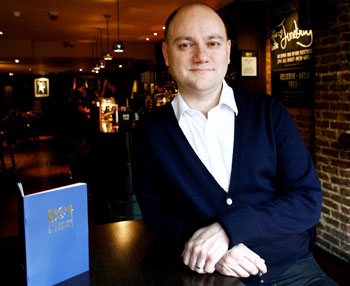As a chain of venues, B@1 has probably done more to pull customers out of pubs and into bars than anyone else in London.

They are bucking the economic trend too, with like-for-like results up on last year, a slew of newly-opened venues, and more on the cards. We spoke to B@1 operations director, Andrew Stones, to find out how they have become so successful.
BLUK: Could you give us some background on how B@1 started?
AS: Well, it was started off by the ‘three boys’ as they are affectionately known: Steve Locke, Leigh Miller and Rhys Oldfield who were bartenders at TGI Friday‘s. They met at the TGI Friday’s Bartender of the Year challenge, got on exceptionally well and decided that they wanted to develop a bar business based on what they would want to drink.
They borrowed some money… car loans, credit cards, that sort of thing and opened Battersea Rise, and that’s 13 years ago now.
BLUK: How many outlets are in the portfolio now?
AS: There are 10: Battersea Rise, Balham, Clapham Common, Richmond, Hammersmith, Putney, Soho, Covent Garden, Spitalfields and Shoreditch.
BLUK: I remember B@1 being nominated for a few awards in the past, how have you done in that respect?
AS: We’ve won a reasonable amount… There is a little bit of what can be perceived as brand snobbery towards B@1. In that we are… ‘cocktails for the masses’ is probably a little bit strong, but we are not a typical mixologist bar.
We are pretty much about serving consistently good drinks to guests through knowledge of products, consistency and good service. That format has absolutely worked for us as a business.
BLUK: Has that become harder to do as the portfolio has grown?
AS: No, we invest, in terms of our bartenders, we invest £5000 training them up. So we recruit for the right behaviours and we want individuals that have great personalities, that are serious about a career about bartending and that have that real drive and passion. It’s quite a rigorous selection process.
BLUK: Will you take someone who has never been behind a bar before?
AS: Absolutely.
BLUK: So what are the characteristics you are looking for?
AS: The key one is personality. So it’s personality, it’s drive and it’s passion. We will take people who have never worked behind a bar before, but they really need to want to do it.
So they have to want that career, that lifestyle. Otherwise you might have people with great personalities and great passion, as we know in this industry, it’s hard work and it won’t work.
BLUK: That’s a lot of money to spend. How do you make sure you keep people after you have spent five grand training them up?
AS: We are a great place to work. We have our ‘all store party’ this coming Monday… We are closing all our bars and we are going to have one hell of a party at the Shoreditch bar.
We have quarterly communications meetings that everybody comes to. Where the area managers, myself, present… so there is good communication.
We’ve just launched an internal newsletter, we give our teams £75 worth of drinks vouchers each every month.
BLUK: Do you operate bartenders and bar backs?
AS: We do. In an ideal world, we want them to become bartenders. As part of that raining process, they join effectively as bar backs. They go through the bar back training in the first couple of days of their time with us. They then begin learning the cocktails.
One of the key differentiators with us and other businesses is we have over 200 cocktails in our menu. We’re about to launch a new menu in April and there will be even more cocktails.
BLUK: And every bartender needs to be able to make all of them without consulting the specs?
AS: They know them all.
BLUK: If we go back to the original ‘three boys’… What was it about them, aside from their drink-making skills, that made them able to set up B@1?
AS: It was… I think they had absolute clarity about what they wanted to achieve with the brand. They had a very clear vision – they still do – for me, I’ve only been with the business now for 6 months, and the boys generally make the right decisions.
They know what works for this business, they now what their guests want, and they’ve kept it simple.
So, the fact that we don’t serve food is a massive benefit for us, in that it is a very simple product. It’s all about the drinks, all about the service and interaction.
One of the other differentiators for us is the atmosphere and we think we do have a good atmosphere in our bars.
BLUK: So if you image two successful bartenders who have great connections with the drinks companies, good reputations, who want to open their own bar. What knowledge do they need to develop, aside from the drinks knowledge, to do so?
AS: You have to know what you want, before you can go out and get it. You have to have tenacity and drive in order to make it work. Business dog-fighting skills are needed when you are trying to secure finance, finding sites etc.
BLUK: If you were a bartender trying to open a bar now, where would you look for finance?
AS: The conventional route is banks, and that’s how we fund this business.
BLUK: If you are going to open a new B@1 in an ‘average London Location’, how much does that cost?
AS: It depends on the site, but in terms of fitting out a B@1 bar, it costs us around £300,000. However Battersea was around £40,000 when it first opened, because the boys did a lot of the work themselves.

